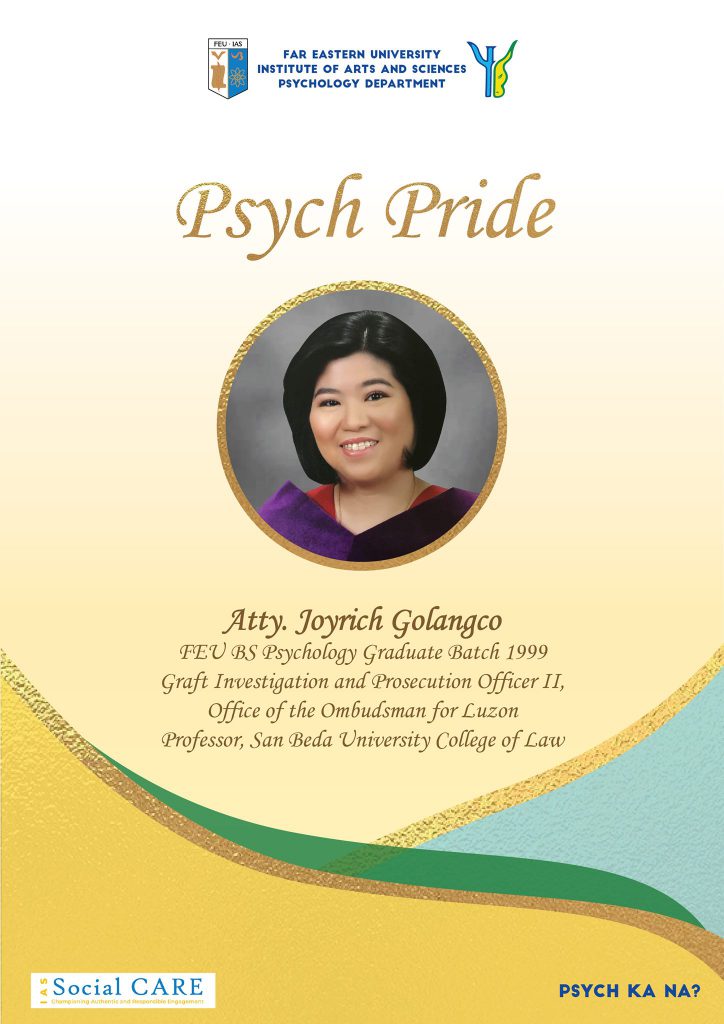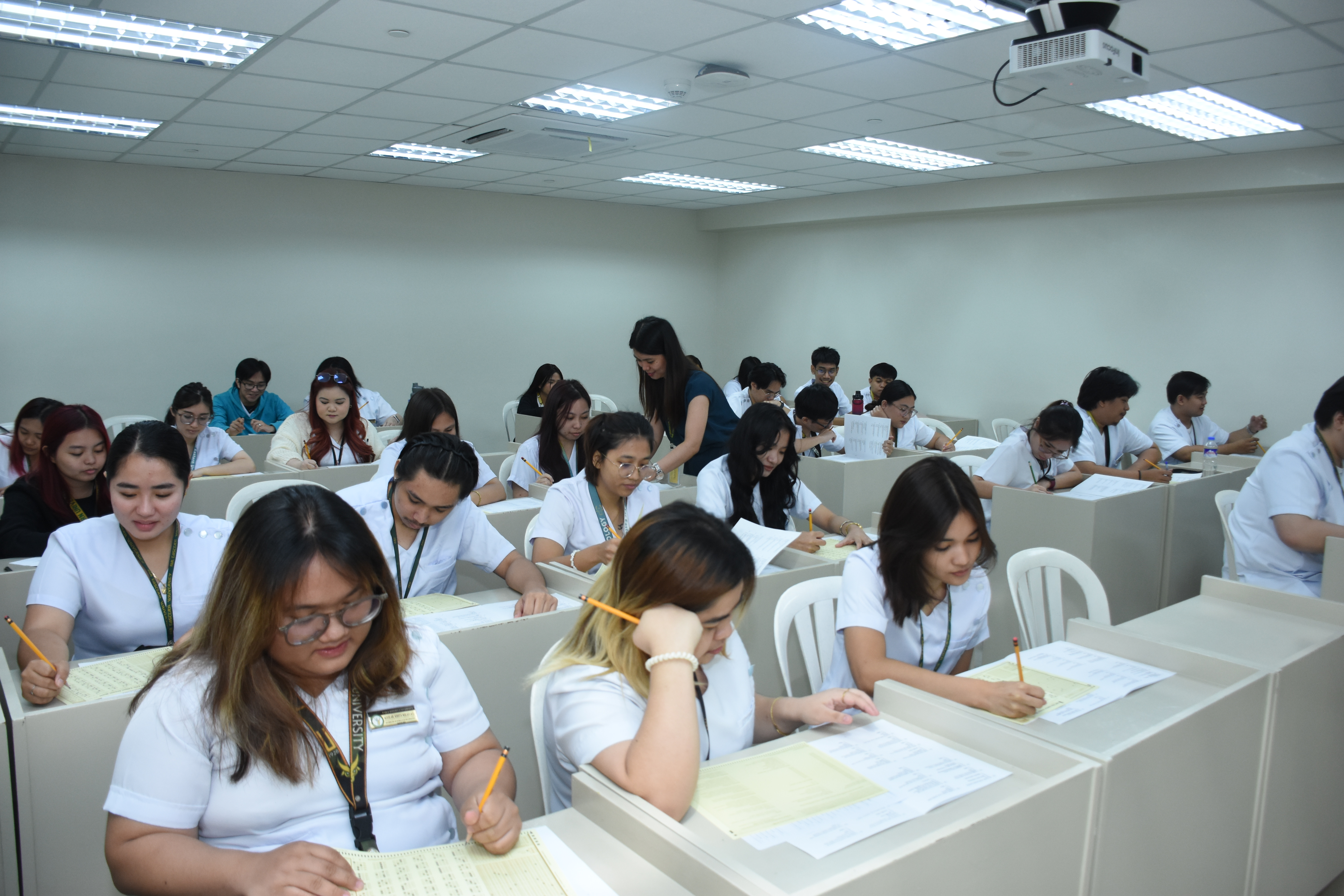Program Curriculum
The first two years of BS Psychology focuses mostly on General Education (GE) courses designed to hone learners’ core competencies such as critical and analytic thinking, oral and written communication skills and independent learning. Using a liberal approach to education, GE courses such as Scholarly Inquiry and Purposive Communication prepare learners for advanced professional courses and research work required later in the curriculum.
Meanwhile, basic professional courses such as Introduction to Psychology, Psychological Statistics, Developmental Psychology, Biological / Physiological Psychology, Experimental Psychology and Theories of Personality are also offered during these crucial two years to provide the learners with foundational knowledge needed before embarking to higher professional courses.
The BS Psychology program has an additional 20 units of natural science electives which include General Inorganic Chemistry, General Zoology, Human Biology, and College Physics.
Before entering the last year of the program, the students are required to apply the concepts and theories in the workplace known as Practicum 1 and Practicum 2. The learners should finish a minimum of 400 hours both for Practicum 1 and 2, Industrial and Clinical Settings.
Well-being and work-life balance is also a key feature of the Psychology curriculum. Throughout their stay in the university, learners are encouraged to plan their own Wellness and Recreation Program (WRP), a university-wide course which intends to develop their physiological and psycho-social fitness as well as encourage social responsibility and community involvement.
Teaching and Learning Approaches
The BS Psychology program has been carefully crafted to empower our students into becoming independent, lifelong learners as future professionals and medical practitioners. As such, this program utilizes the following varied teaching-learning approaches focused on learners’ needs and capabilities:
- Student-centered learning. The BS Psychology program adheres with the University’s educational philosophy and learning paradigm which emphasizes active and dynamic learning to develop the higher-order thinking skills of our learners. This entails designing engaging activities and encouraging collaboration between teacher and student inside the classroom to facilitate effective higher learning.
- Didactic approach. The program utilizes a variety of lectures, discussions and demonstrations in developing theoretical and foundational knowledge in the various settings (clinical, industrial, educational, etc.) in psychology.
- Interdisciplinary approach. BS Psychology offers a glimpse of professional practice in psychometrics and psychology through the lens of various fields in psychology such as clinical, industrial and educational settings. Coupled with the liberal GE courses which expose learners to the humanities and other social sciences, the program hopes to produce well-rounded, adaptable and analytical practitioners in psychometry and psychology.
- Blended learning. The BS Psychology program recognizes the changing technological landscape which our current generation of learners must navigate. Geared towards ubiquitous and independent learning, some courses are delivered through a mix of online virtual classrooms, self-study modules and face-to-face sessions. The University utilizes Canvas, a world-class learning management system to facilitate this mode of delivery.
- Research-based approach. Aside from didactic and demonstrative approaches, the program utilizes case studies and research-based materials to ensure that learners are provided with updated knowledge and practices in the field. Moreover, the program encourages learners to develop an inclination towards research and scientific thought.
Assessment and Research
Throughout the course of the program, varied assessments and assessment-related tasks are deployed depending on the negotiation between the teachers and the learners. Teachers are encouraged to develop relevant formative assessments designed to help learners prepare for capstone summative assessments.
Assessments are a combination of traditional pen-and-paper tests, practical examinations, research work and performance-based tasks. These include quizzes and summative tests, reports and presentations, case analyses, research-based writing, return demonstration and peer assessments. Apart from course-based assessments, research is also integrated into the curriculum such as the course Research in Psychology 1 and 2, Research Paper Writing and Presentation.
The required course audit examinations at the end of fourth year are a standardized pen-and-paper test which assess the learners’ acquired knowledge and technical know-how in their professional courses before taking the Board Licensure Exam for Psychometrician (BLEP).
Internship
Learners cannot complete the program without internship, which comprises six (6) units of their coursework which is equivalent to 400 hours. Practicum is divided into 2, Practicum 1 (Industrial setting) and Practicum 2 (Clinical setting). Both practicums are to be taken during summer which is equivalent to 50 days of 8 hours work per day. Students’ practicum engagements are under a CHED-accredited training company for industrial setting and accredited clinics, hospitals, mental health centers of their choice.
During practicum, BS Psychology learners are expected to apply concepts and theories related to Industrial Psychology, Abnormal Psychology, Psychological Assessment and Clinical Psychology.



